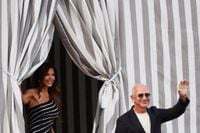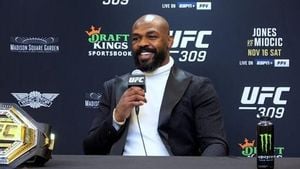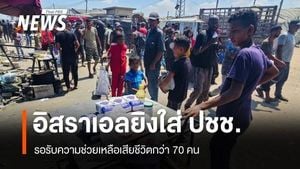Jeff Bezos, the founder of Amazon and the world's third richest person, celebrated his second wedding in extraordinary style in Venice, Italy, on June 26, 2025. The lavish event, which spanned three days, was marked by opulence, star-studded guest lists, and a swirl of controversy that highlighted the complex relationship between wealth, culture, and community in one of the world's most iconic cities.
The wedding festivities kicked off with a reception at the historic Madonna dell'Orto Church in Venice's Cannaregio district, followed by the main ceremony at the San Giorgio Maggiore Church on the island of the same name. The celebrations continued with a grand reception at the Arsenale exhibition hall, a medieval shipyard complex in the Castello district, known for its strategic location surrounded by water and restricted access, ensuring privacy and security for the guests.
Approximately 200 guests attended the event, including a constellation of celebrities and influential figures from various sectors. Among the notable attendees were Kim Kardashian and her family, Ivanka Trump—the daughter of then U.S. President Donald Trump—and her husband Jared Kushner, Oprah Winfrey, Hollywood actors Leonardo DiCaprio and Orlando Bloom, pop star Usher, supermodel Kendall Jenner, former NFL star Tom Brady, and media mogul Barry Diller with his wife, the renowned designer Diane von Furstenberg. The presence of such high-profile guests underscored the event's exclusivity and grandeur.
Lauren Sánchez, Bezos's fiancée and a former news anchor turned aviation entrepreneur, drew attention with her striking golden off-shoulder dress from Schiaparelli's Spring 2025 haute couture collection. Designed by Daniel Roseberry, the dress, named 'Icarus,' featured intricate embroidery of swirling vines, flowers, and eye motifs, reflecting a blend of art and surrealism that Schiaparelli is famed for since its founding by Elsa Schiaparelli in 1927.
The financial scale of the wedding was staggering. Estimates put the cost between 40 million and 56 million euros (approximately 63.4 to 76 billion South Korean won), with local authorities projecting the upper end of the budget. The couple arrived in Venice by helicopter on June 25 and stayed at the Aman Venice hotel, where rooms overlooking the Grand Canal reportedly cost at least 4,000 euros (about 6.3 million won) per night. The wedding's economic impact was significant, with the governor of Veneto, Luca Zaia, highlighting the influx of wealth and the deployment of 90 private jets to the region for the event, likening its value to that of five Super Bowl victories.
However, the extravagance of the wedding was not without its detractors. Venice, a UNESCO World Heritage site famous for its unique architecture and waterways, has faced decades of challenges including population decline—down by more than half over recent decades—and the pressures of mass tourism leading to a dwindling local community. Many residents and activist groups viewed the wedding as a symbol of the city’s commodification and alienation from its own people.
Protests erupted across Venice, with banners reading “No Space for Bezos” appearing throughout the city and a large sign on the Rialto Bridge condemning the event. Greenpeace and other environmental groups joined the outcry, emphasizing the need for taxing the wealthy to support the planet. One protester told BBC, “We are just ordinary citizens, but we gathered our strength and finally drove one of the most influential people in the world out of our city.” The tension underscored the complex dynamics between economic benefit and social impact in tourist-heavy locations.
In response to the backlash, Bezos and Sánchez relocated some wedding events from central Venice to more remote areas with limited access to minimize disruption. Additionally, the couple made donations totaling approximately 3 million dollars (about 4.1 billion won) to three Venice-based organizations: CORILA, a consortium for research on the Venice lagoon ecosystem; the UNESCO Venice Office; and Venice International University. Their wedding invitations explicitly declined gifts, instead requesting donations to support Venice, a gesture aimed at mitigating criticism.
Local officials largely welcomed the event, emphasizing its potential to boost the local economy. Venice's mayor, Luigi Brugnaro, stated, “We must apologize to Jeff Bezos,” while Governor Zaia called for the city to embrace the billionaire, criticizing protests as shameful given the wealth and attention brought to the region.
Beyond the wedding, the story of Jeff Bezos is one of remarkable ambition and transformation. Born in Albuquerque, New Mexico, in 1964, Bezos began his working life flipping burgers at McDonald's, earning $2.69 an hour. His early experiences instilled in him a deep understanding of operational efficiency and customer service—principles that would later underpin Amazon's meteoric rise.
After graduating from Princeton University with a degree in computer science, Bezos worked in finance and technology before founding Amazon in 1994. What began as an online bookstore quickly expanded into a global e-commerce powerhouse, diversifying into countless product categories and services like Amazon Prime, which revolutionized delivery standards. Today, Amazon is valued in the trillions of dollars, and Bezos's personal fortune exceeds 215 billion dollars, making him one of the wealthiest people on the planet.
The union with Lauren Sánchez, a former Fox TV anchor and helicopter pilot who founded an aerial filming company and worked for Bezos's space venture Blue Origin, marks a new chapter in Bezos's personal life. Their relationship, publicly confirmed in 2023, culminated in this extravagant wedding that, despite its controversies, showcased the intersection of wealth, celebrity, and global culture.
As the celebrations concluded, Venice remained a city of contrasts: a place where the grandeur of a billionaire's wedding sparked both awe and protest, reflecting broader debates about the future of heritage sites in an increasingly commercialized world. The event posed a question many cities face today—how to balance economic opportunity with preserving the soul of a community.
![톱스타 집결∙620억 쓴다는데…베네치아는 왜 ‘베이조스 재혼식’ 싫어할까[디브리핑]](https://thumbor.evrimagaci.org/u96ig-IKLhYmBdxltm9LhHeWXnA=/200x0/tpg%2Fsources%2F3203aacf-4b40-4657-ba20-103154b00063.jpeg)




